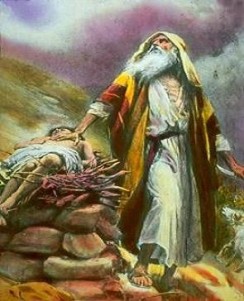Blog Archives
The Road to Moriah
God said to Abraham, “Take your son, your only son Isaac, whom you love, and go to the land of Moriah, and offer him there as a burnt offering on one of the mountains that I will show you” (Genesis 22:2).
The road to Moriah is a dark road. It’s dark because it means that Abraham has to give up what means the most to him, his only son, Isaac. There’s more to it than that, though. Isaac isn’t just Abraham’s son, he’s the fulfillment of the promise, “I have made you the ancestor of a multitude of nations” (Genesis 17:5).
Do you ever get to a place where God seems distant, remote, or even silent? What do you do? Abraham was in a place where God seemed to contradict himself. That He wants to remove the promise that He Himself gave Abraham all those years before.
You may know what it means to walk in darkness. Sometimes faith is walking in darkness and absolutely refusing to quit. Sometimes it is just hanging on. Faith that allows us to be transformed by darkness and suffering is not being doubt-free, it is a tenacious obedience.
As Abraham raises his hand to destroy his only son, his promise, he somehow believes. He is not perfect in his belief, he has never been perfect in his belief. He tried to help God out in His promise by impregnating Hagar. This is the irony of Abraham. His journey of faith is riddled with doubt.
Just before Abraham plunged the knife into his son, the son whom he loved with all his heart, the angel of the Lord called out to him twice. It’s as if the angel wants to make sure he hears before it’s too late, “Abraham, Abraham!”
Abraham answers, “Here I am.” The angel speaks, “Do not lay your hand on the boy or do anything to him” (Genesis 22:12). In that instant Abraham is given back his promise, and the Lord provided a ram for the sacrifice.
Abraham doesn’t see everything. He never saw the fulfillment of the promise. He just hangs on. Suffering by itself doesn’t produce perseverance, it’s only suffering that is endured in faith.
